Abstract
The effects of intermittent infusions of dobutamine were studied in young normal male subjects during a period of bedrest deconditioning to determine whether this synthetic catechol affects physical conditioning processes in humans. 24 volunteers were placed at bedrest and randomized to daily 2-h treatments of saline infusions (control), dobutamine infusions, or maintenance exercise (control). Exercise, hemodynamic, and metabolic studies were performed at base line and at the termination of the 3-wk treatment period. Maximal exercise (duration, oxygen consumption, and workload) fell for the saline group and remained unchanged for the dobutamine and exercise groups. Hemodynamics during exercise were maintained the same as pretreatment base line for the dobutamine and exercise groups, whereas stroke volume and cardiac output dropped and heart rate rose for the saline group. The metabolic profile showed an increased blood lactate response at rest and during submaximal exercise after 3 wk of bedrest for the saline group, and essentially no change for the exercise and the dobutamine groups. Extraction of oxygen across the exercising lower limb rose for the dobutamine group, as did the activity of the skeletal muscle oxidative enzymes, citrate synthetase, and succinate dehydrogenase. In contrast to the exercise control group, the saline and dobutamine groups developed orthostatic hypotension, tachycardia, and accentuation of the renin-aldosterone response over the 3-wk treatment period; for the saline group, this is best explained by the observed fall in blood volume and for the dobutamine group, by the blunting of vascular vasoconstrictive responses. During a period of bedrest deconditioning in humans, infusions of dobutamine maintain many of the physiologic expressions of physical conditioning.
Full text
PDF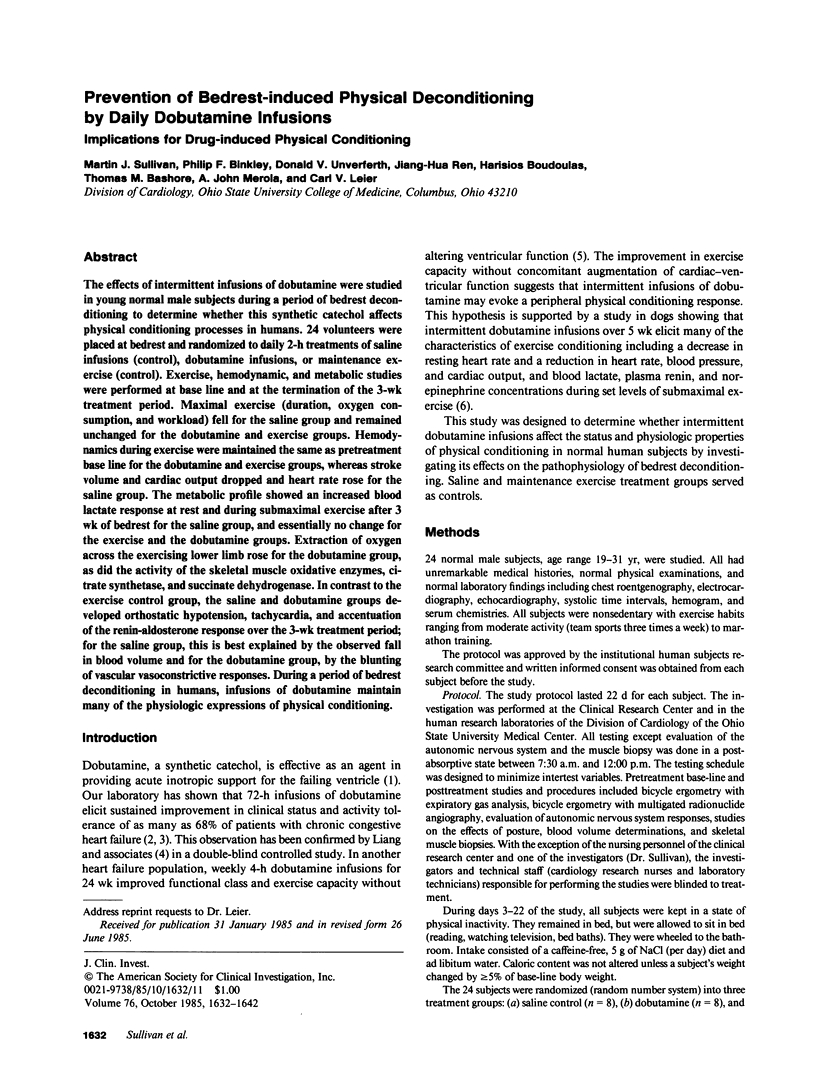
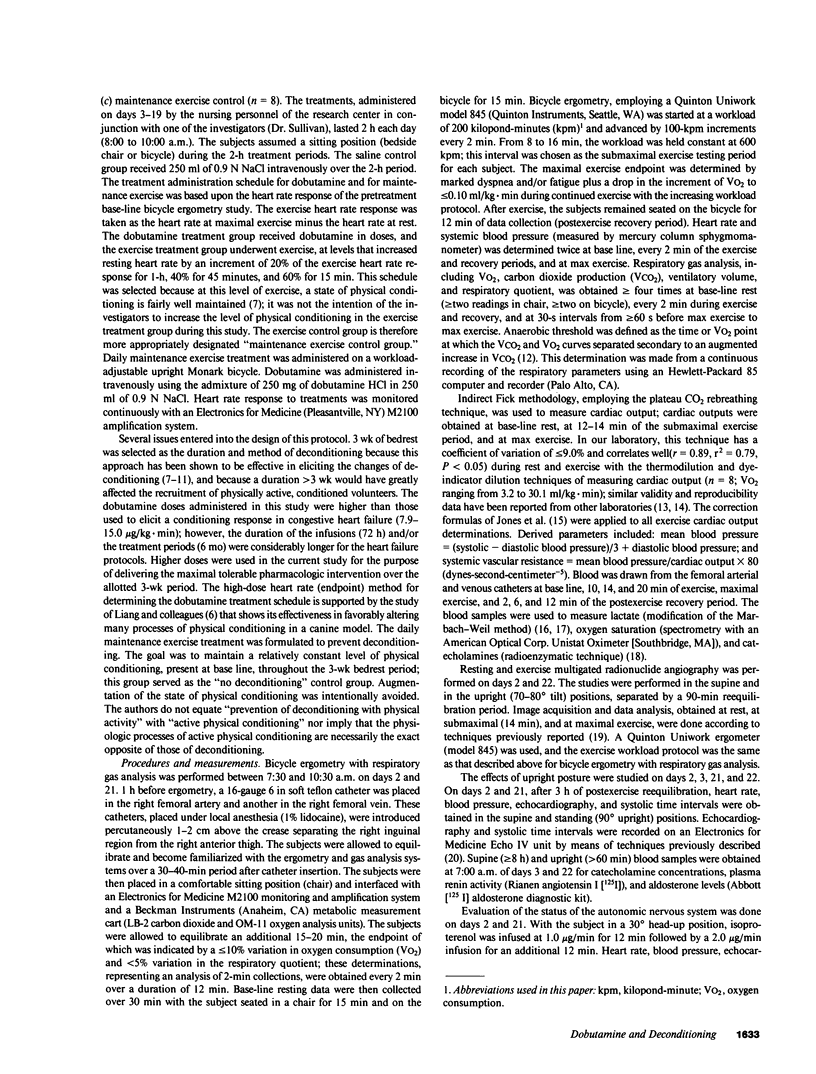
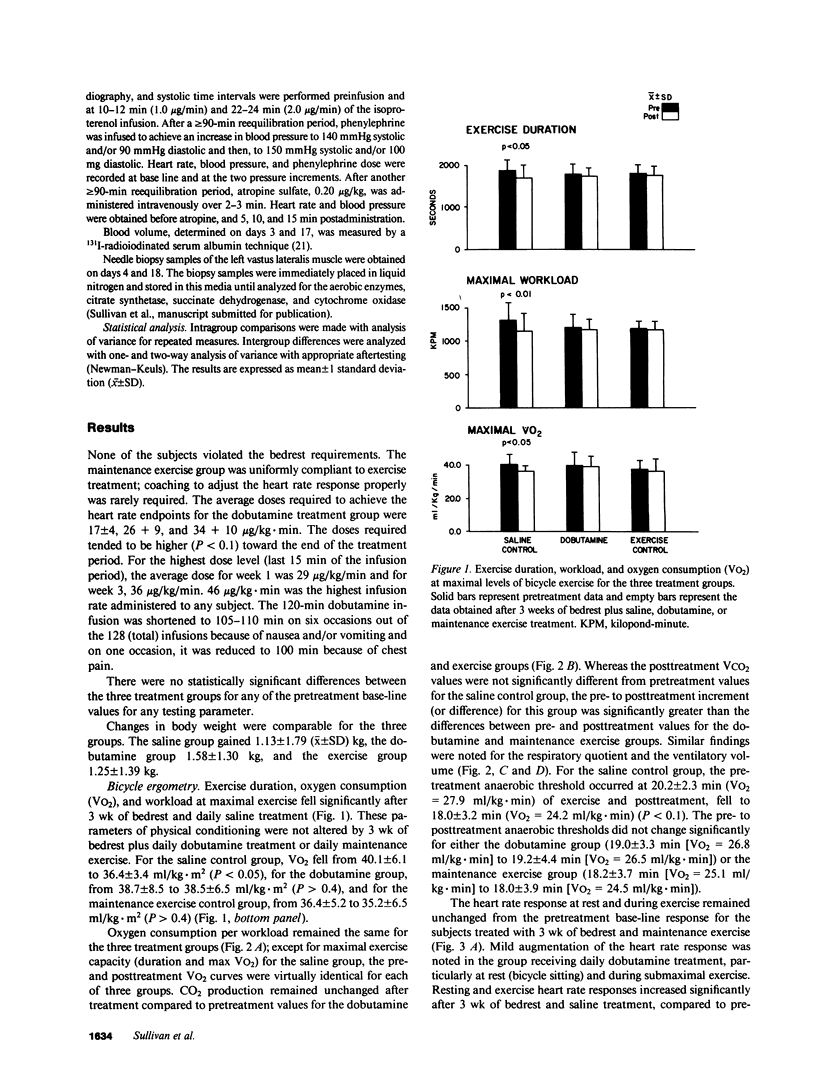
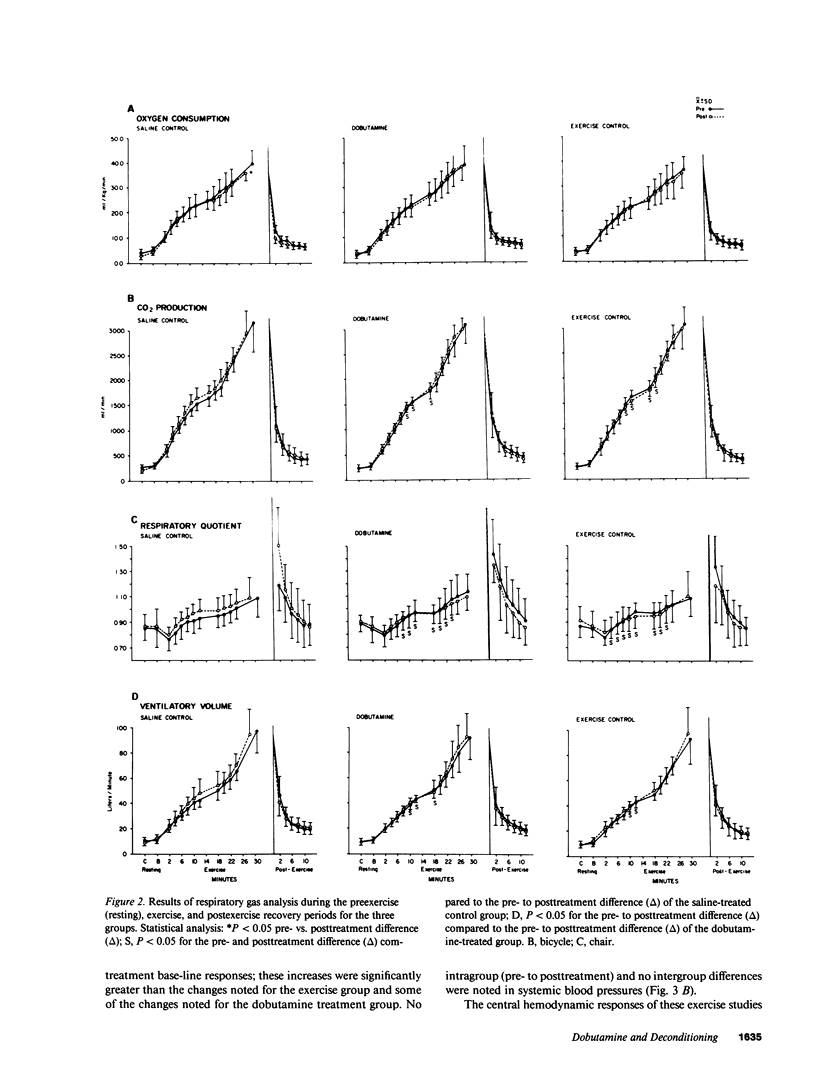
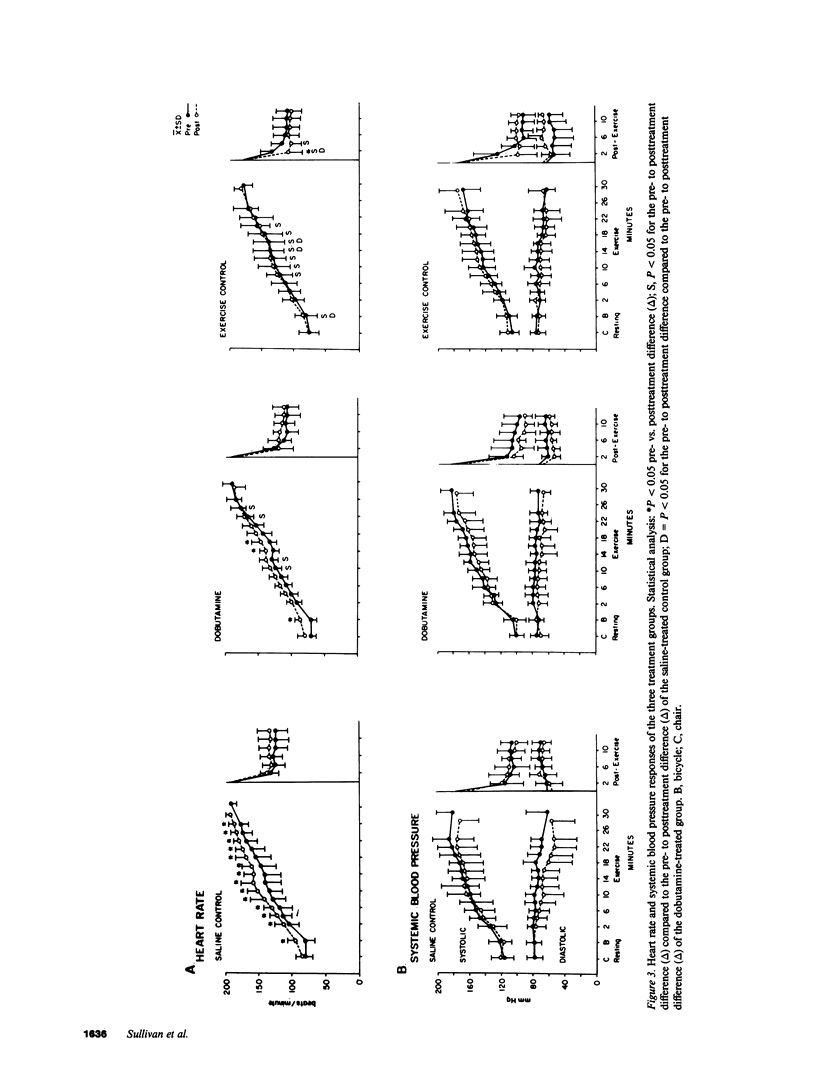
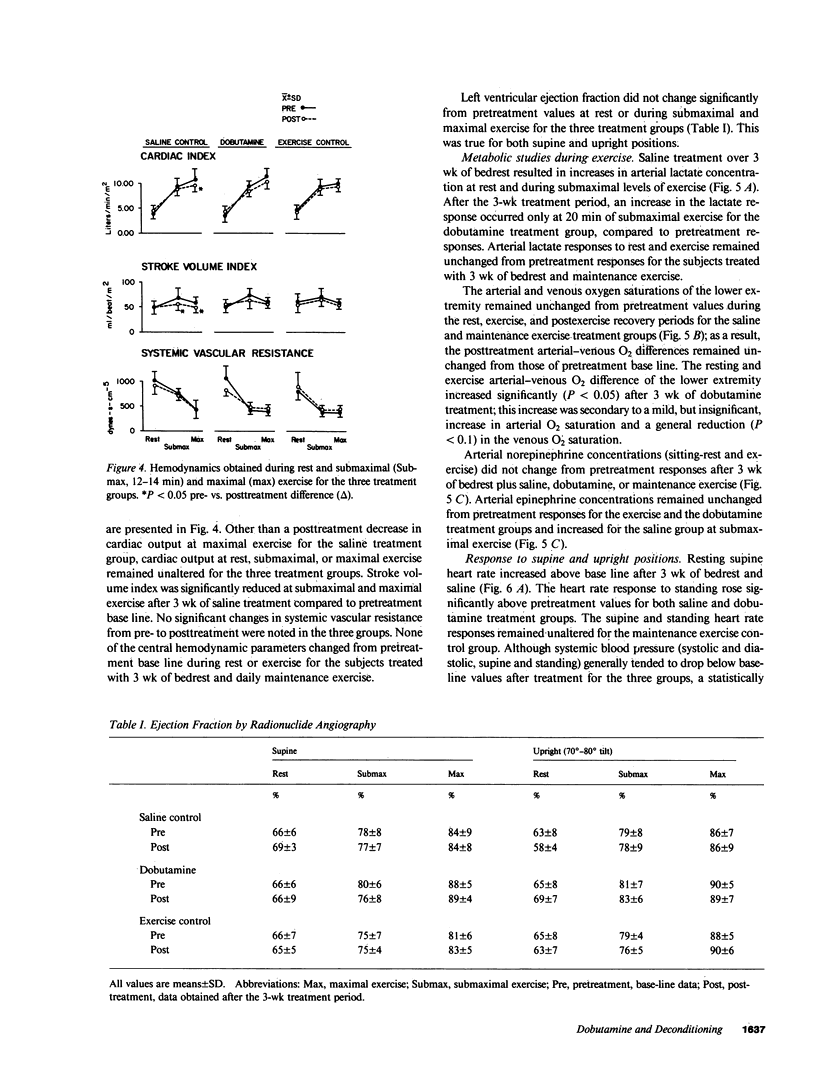
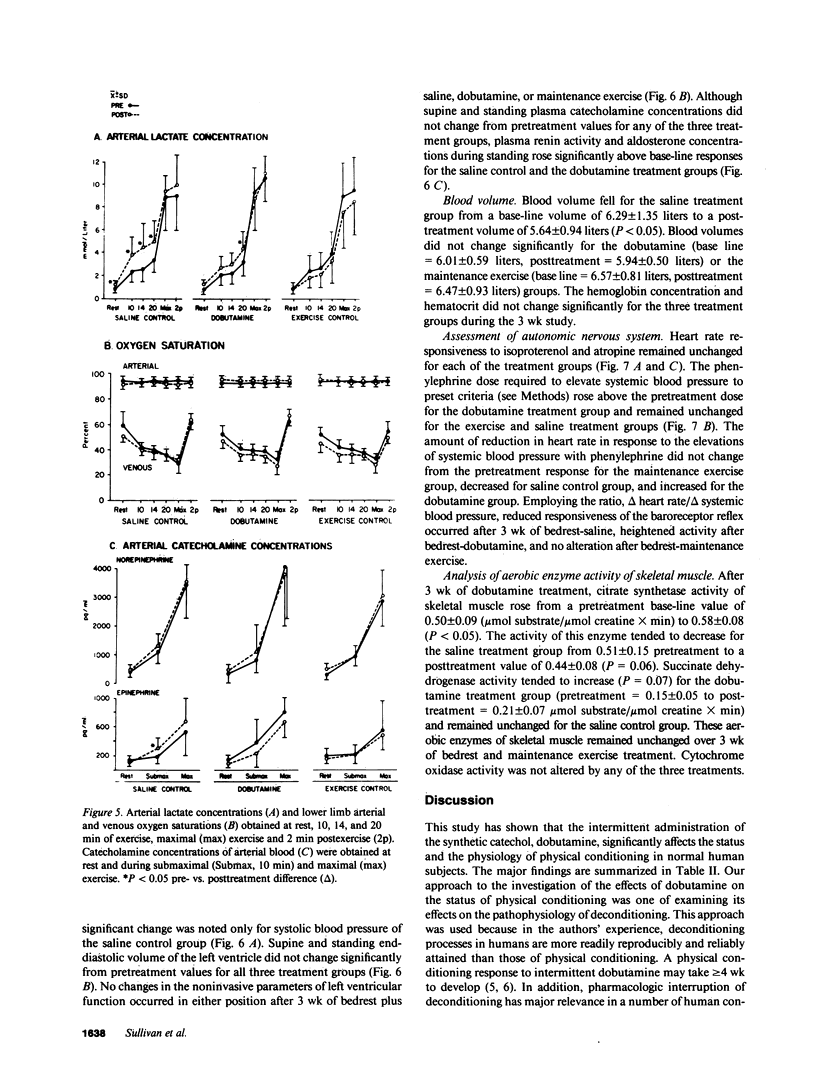
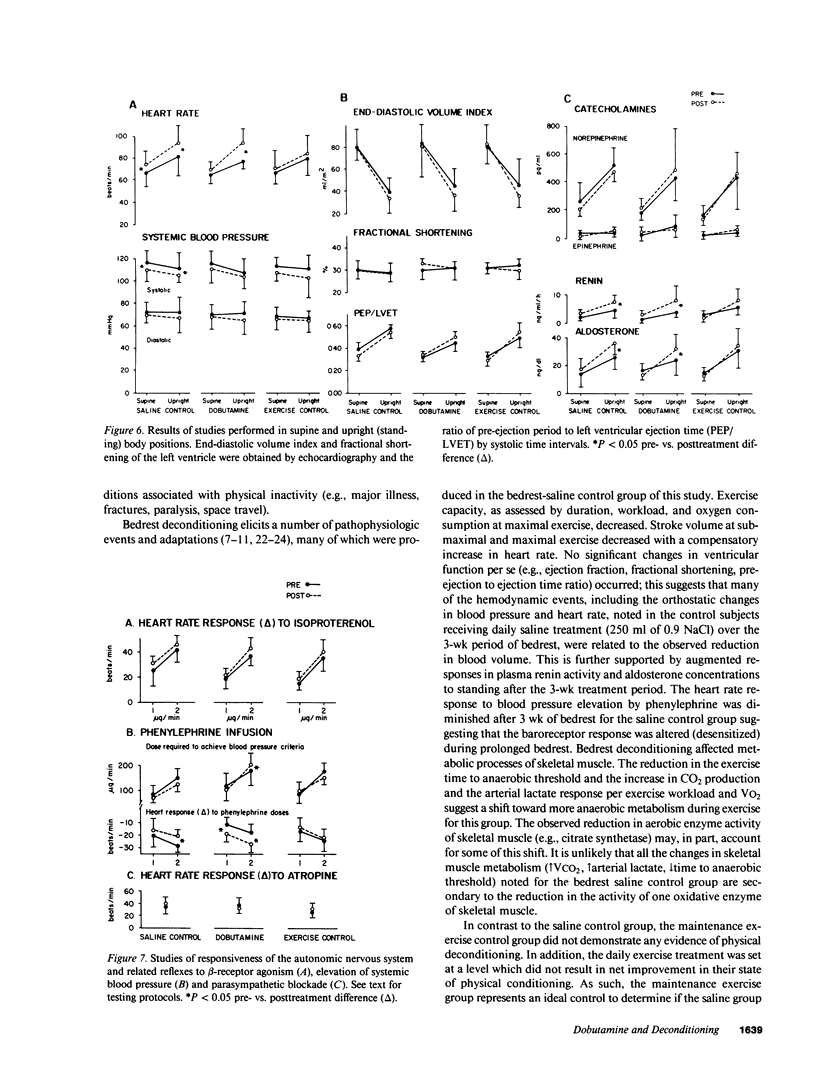
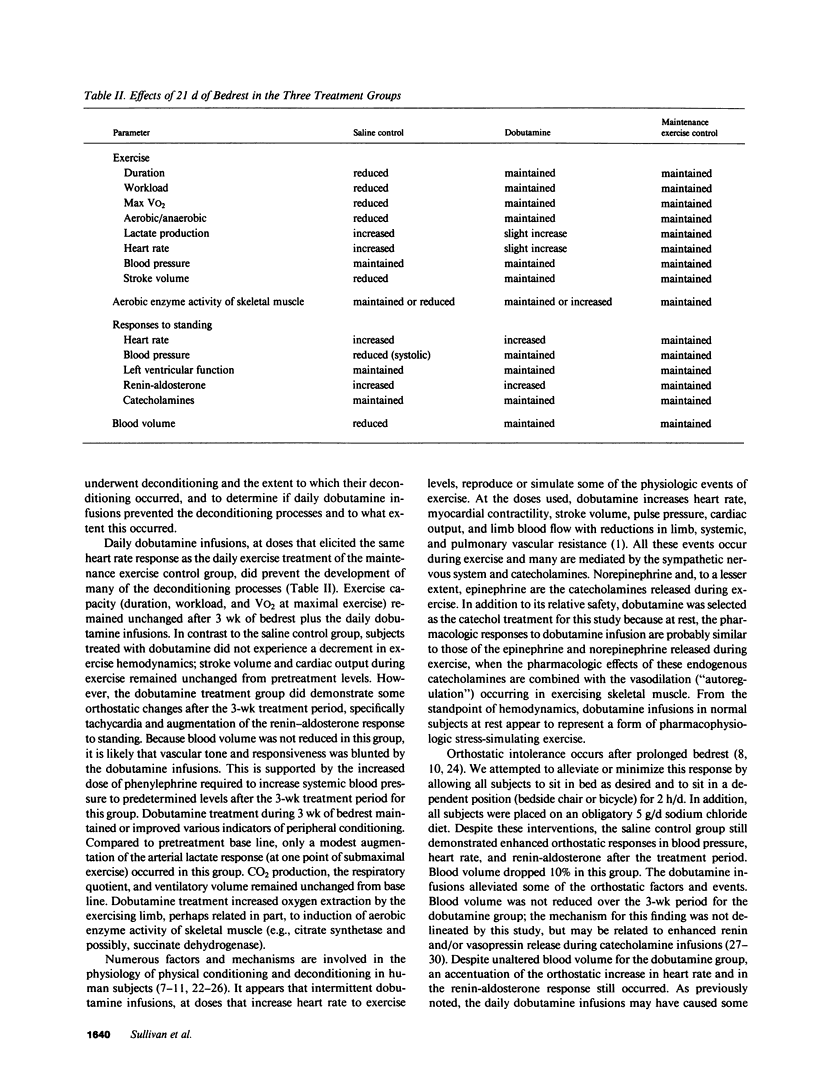
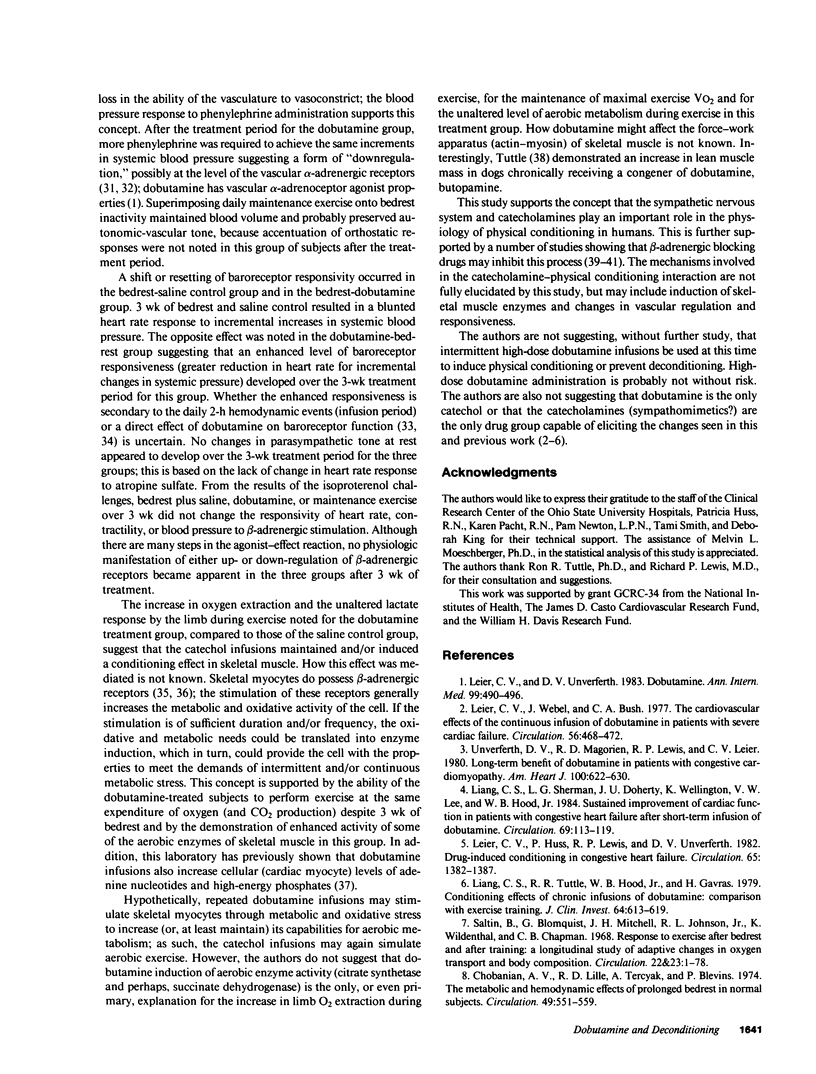
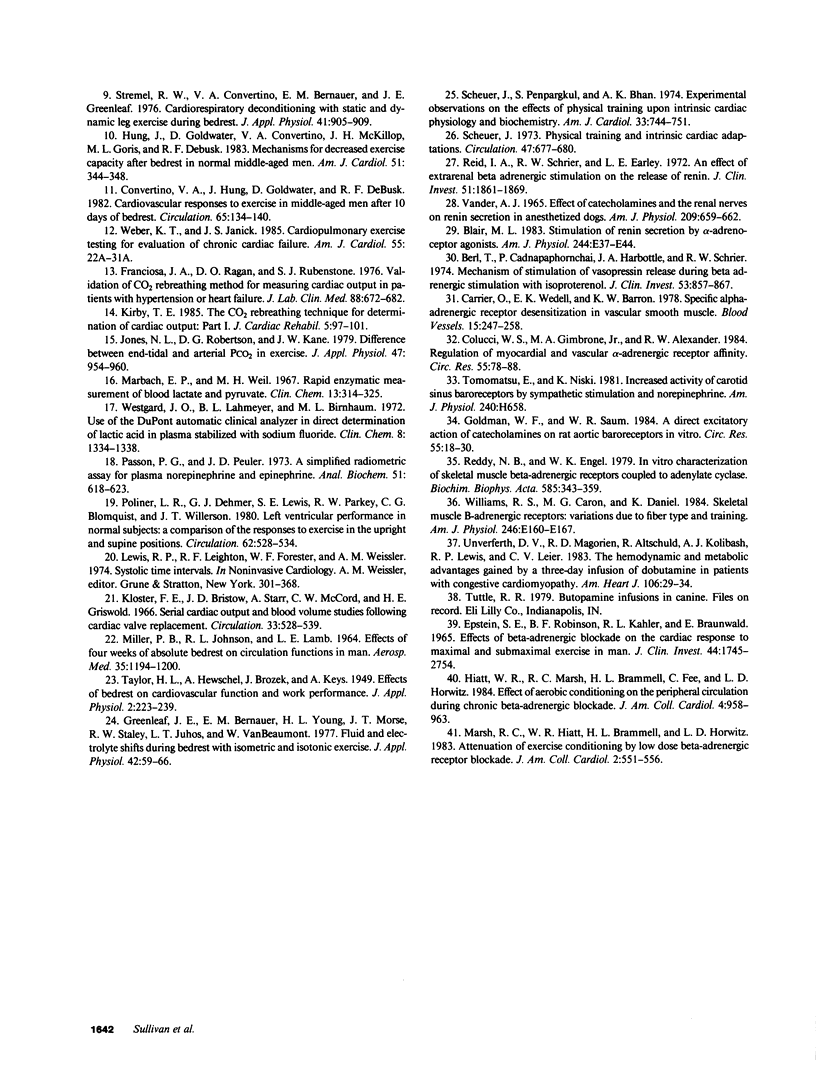
Selected References
These references are in PubMed. This may not be the complete list of references from this article.
- Berl T., Cadnapaphornchai P., Harbottle J. A., Schrier R. W. Mechanism of stimulation of vasopressin release during beta adrenergic stimulation with isoproterenol. J Clin Invest. 1974 Mar;53(3):857–867. doi: 10.1172/JCI107626. [DOI] [PMC free article] [PubMed] [Google Scholar]
- Blair M. L. Stimulation of renin secretion by alpha-adrenoceptor agonists. Am J Physiol. 1983 Jan;244(1):E37–E44. doi: 10.1152/ajpendo.1983.244.1.E37. [DOI] [PubMed] [Google Scholar]
- Carrier O., Jr, Wedell E. K., Barron K. W. Specific alpha-adrenergic receptor desensitization in vascular smooth muscle. Blood Vessels. 1978;15(4):247–258. doi: 10.1159/000158170. [DOI] [PubMed] [Google Scholar]
- Chobanian A. V., Lille R. D., Tercyak A., Blevins P. The metabolic and hemodynamic effects of prolonged bed rest in normal subjects. Circulation. 1974 Mar;49(3):551–559. doi: 10.1161/01.cir.49.3.551. [DOI] [PubMed] [Google Scholar]
- Colucci W. S., Gimbrone M. A., Jr, Alexander R. W. Regulation of myocardial and vascular alpha-adrenergic receptor affinity. Effects of guanine nucleotides, cations, estrogen, and catecholamine depletion. Circ Res. 1984 Jul;55(1):78–88. doi: 10.1161/01.res.55.1.78. [DOI] [PubMed] [Google Scholar]
- Convertino V., Hung J., Goldwater D., DeBusk R. F. Cardiovascular responses to exercise in middle-aged men after 10 days of bedrest. Circulation. 1982 Jan;65(1):134–140. doi: 10.1161/01.cir.65.1.134. [DOI] [PubMed] [Google Scholar]
- Epstein S., Robinson B. F., Kahler R. L., Braunwald E. Effects of beta-adrenergic blockade on the cardiac response to maximal and submaximal exercise in man. J Clin Invest. 1965 Nov;44(11):1745–1753. doi: 10.1172/JCI105282. [DOI] [PMC free article] [PubMed] [Google Scholar]
- Franciosa J. A., Ragan D. O., Rubenstone S. J. Validation of the CO2 rebreathing method for measuring cardiac output in patients with hypertension or heart failure. J Lab Clin Med. 1976 Oct;88(4):672–682. [PubMed] [Google Scholar]
- Goldman W. F., Saum W. R. A direct excitatory action of catecholamines on rat aortic baroreceptors in vitro. Circ Res. 1984 Jul;55(1):18–30. doi: 10.1161/01.res.55.1.18. [DOI] [PubMed] [Google Scholar]
- Greenleaf J. E., Bernauer E. M., Young H. L., Morse J. T., Staley R. W., Juhos L. T., Van Beaumont W. Fluid and electrolyte shifts during bed rest with isometric and isotonic exercise. J Appl Physiol Respir Environ Exerc Physiol. 1977 Jan;42(1):59–66. doi: 10.1152/jappl.1977.42.1.59. [DOI] [PubMed] [Google Scholar]
- Hiatt W. R., Marsh R. C., Brammell H. L., Fee C., Horwitz L. D. Effect of aerobic conditioning on the peripheral circulation during chronic beta-adrenergic blockade. J Am Coll Cardiol. 1984 Nov;4(5):958–963. doi: 10.1016/s0735-1097(84)80057-1. [DOI] [PubMed] [Google Scholar]
- Hung J., Goldwater D., Convertino V. A., McKillop J. H., Goris M. L., DeBusk R. F. Mechanisms for decreased exercise capacity after bed rest in normal middle-aged men. Am J Cardiol. 1983 Jan 15;51(2):344–348. doi: 10.1016/s0002-9149(83)80063-0. [DOI] [PubMed] [Google Scholar]
- Jones N. L., Robertson D. G., Kane J. W. Difference between end-tidal and arterial PCO2 in exercise. J Appl Physiol Respir Environ Exerc Physiol. 1979 Nov;47(5):954–960. doi: 10.1152/jappl.1979.47.5.954. [DOI] [PubMed] [Google Scholar]
- Kloster F. E., Bristow J. D., Starr A., McCord C. W., Griswold H. E. Serial cardiac output and blood volume studies following cardiac valve replacement. Circulation. 1966 Apr;33(4):528–539. doi: 10.1161/01.cir.33.4.528. [DOI] [PubMed] [Google Scholar]
- Leier C. V., Huss P., Lewis R. P., Unverferth D. V. Drug-induced conditioning in congestive heart failure. Circulation. 1982 Jun;65(7):1382–1387. doi: 10.1161/01.cir.65.7.1382. [DOI] [PubMed] [Google Scholar]
- Leier C. V., Unverferth D. V. Drugs five years later. Dobutamine. Ann Intern Med. 1983 Oct;99(4):490–496. doi: 10.7326/0003-4819-99-4-490. [DOI] [PubMed] [Google Scholar]
- Leier C. V., Webel J., Bush C. A. The cardiovascular effects of the continuous infusion of dobutamine in patients with severe cardiac failure. Circulation. 1977 Sep;56(3):468–472. doi: 10.1161/01.cir.56.3.468. [DOI] [PubMed] [Google Scholar]
- Liang C. S., Sherman L. G., Doherty J. U., Wellington K., Lee V. W., Hood W. B., Jr Sustained improvement of cardiac function in patients with congestive heart failure after short-term infusion of dobutamine. Circulation. 1984 Jan;69(1):113–119. doi: 10.1161/01.cir.69.1.113. [DOI] [PubMed] [Google Scholar]
- Liang C., Tuttle R. R., Hood W. B., Jr, Gavras H. Conditioning effects of chronic infusions of dobutamine. Comparison with exercise training. J Clin Invest. 1979 Aug;64(2):613–619. doi: 10.1172/JCI109501. [DOI] [PMC free article] [PubMed] [Google Scholar]
- MILLER P. B., JOHNSON R. L., LAMB L. E. EFFECTS OF FOUR WEEKS OF ABSOLUTE BED REST ON CIRCULATORY FUNCTIONS IN MAN. Aerosp Med. 1964 Dec;35:1194–1200. [PubMed] [Google Scholar]
- Marbach E. P., Weil M. H. Rapid enzymatic measurement of blood lactate and pyruvate. Use and significance of metaphosphoric acid as a common precipitant. Clin Chem. 1967 Apr;13(4):314–325. [PubMed] [Google Scholar]
- Marsh R. C., Hiatt W. R., Brammell H. L., Horwitz L. D. Attenuation of exercise conditioning by low dose beta-adrenergic receptor blockade. J Am Coll Cardiol. 1983 Sep;2(3):551–556. doi: 10.1016/s0735-1097(83)80284-8. [DOI] [PubMed] [Google Scholar]
- Passon P. G., Peuler J. D. A simplified radiometric assay for plasma norepinephrine and epinephrine. Anal Biochem. 1973 Feb;51(2):618–631. doi: 10.1016/0003-2697(73)90517-4. [DOI] [PubMed] [Google Scholar]
- Physical training and intrinsic cardiac adaptations. Circulation. 1973 Apr;47(4):677–680. doi: 10.1161/01.cir.47.4.677. [DOI] [PubMed] [Google Scholar]
- Poliner L. R., Dehmer G. J., Lewis S. E., Parkey R. W., Blomqvist C. G., Willerson J. T. Left ventricular performance in normal subjects: a comparison of the responses to exercise in the upright and supine positions. Circulation. 1980 Sep;62(3):528–534. doi: 10.1161/01.cir.62.3.528. [DOI] [PubMed] [Google Scholar]
- Reddy N. B., Engel W. K. In vitro characterization of skeletal muscle beta-adrenergic receptors coupled to adenylate cyclase. Biochim Biophys Acta. 1979 Jul 4;585(3):343–359. doi: 10.1016/0304-4165(79)90079-5. [DOI] [PubMed] [Google Scholar]
- Reid I. A., Schrier R. W., Earley L. E. An effect of extrarenal beta adrenergic stimulation on the release of renin. J Clin Invest. 1972 Jul;51(7):1861–1869. doi: 10.1172/JCI106988. [DOI] [PMC free article] [PubMed] [Google Scholar]
- Scheuer J., Penpargkul S., Bhan A. K. Experimental observations on the effects of physical training upon intrinsic cardiac physiology and biochemistry. Am J Cardiol. 1974 May 20;33(6):744–751. doi: 10.1016/0002-9149(74)90215-x. [DOI] [PubMed] [Google Scholar]
- Stremel R. W., Convertino V. A., Bernauer E. M., Greenleaf J. E. Cardiorespiratory deconditioning with static and dynamic leg exercise during bed rest. J Appl Physiol. 1976 Dec;41(6):905–909. doi: 10.1152/jappl.1976.41.6.905. [DOI] [PubMed] [Google Scholar]
- TAYLOR H. L., HENSCHEL A. Effects of bed rest on cardiovascular function and work performance. J Appl Physiol. 1949 Nov;2(5):223–239. doi: 10.1152/jappl.1949.2.5.223. [DOI] [PubMed] [Google Scholar]
- Tomomatsu E., Nishi K. Increased activity of carotid sinus baroreceptors by sympathetic stimulation and norepinephrine. Am J Physiol. 1981 Apr;240(4):H650–H658. doi: 10.1152/ajpheart.1981.240.4.H650. [DOI] [PubMed] [Google Scholar]
- Unverferth D. V., Magorien R. D., Altschuld R., Kolibash A. J., Lewis R. P., Leier C. V. The hemodynamic and metabolic advantages gained by a three-day infusion of dobutamine in patients with congestive cardiomyopathy. Am Heart J. 1983 Jul;106(1 Pt 1):29–34. doi: 10.1016/0002-8703(83)90434-9. [DOI] [PubMed] [Google Scholar]
- Unverferth D. V., Magorien R. D., Lewis R. P., Leier C. V. Long-term benefit of dobutamine in patients with congestive cardiomyopathy. Am Heart J. 1980 Nov;100(5):622–630. doi: 10.1016/0002-8703(80)90226-4. [DOI] [PubMed] [Google Scholar]
- Vander A. J. Effect of catecholamines and the renal nerves on renin secretion in anesthetized dogs. Am J Physiol. 1965 Sep;209(3):659–662. doi: 10.1152/ajplegacy.1965.209.3.659. [DOI] [PubMed] [Google Scholar]
- Westgard J. O., Lahmeyer B. L., Birnbaum M. L. Use of the Du Pont "automatic clinical analyzer" in direct determination of lactic acid in plasma stabilized with sodium fluoride. Clin Chem. 1972 Nov;18(11):1334–1338. [PubMed] [Google Scholar]
- Williams R. S., Caron M. G., Daniel K. Skeletal muscle beta-adrenergic receptors: variations due to fiber type and training. Am J Physiol. 1984 Feb;246(2 Pt 1):E160–E167. doi: 10.1152/ajpendo.1984.246.2.E160. [DOI] [PubMed] [Google Scholar]


